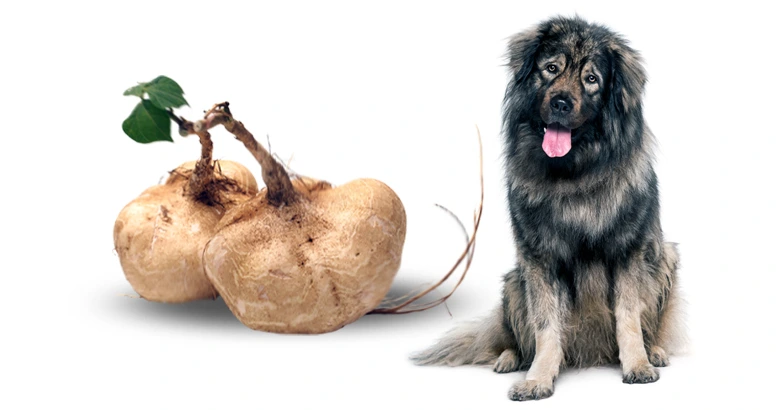Jicama, also known as Mexican yam bean or Mexican turnip, is a popular root vegetable enjoyed in salads, snacks, and various dishes. But what about our furry friends? Can dogs eat jicama? In this article, we’ll explore whether jicama is safe for dogs, its potential benefits, and what you should know before adding it to your dog’s diet.
What is Jicama?
Jicama is a crunchy root vegetable that is native to Mexico and Central America. It has a sweet, nutty flavor and is often enjoyed raw in salads or as a snack. It is low in calories and high in fiber, making it a healthy choice for humans. But is it suitable for dogs?
Is Jicama Safe for Dogs?
Yes, dogs can eat jicama! This root vegetable is non-toxic to dogs and can be a healthy addition to their diet when prepared properly. However, there are a few important considerations to keep in mind.
Nutritional Benefits of Jicama for Dogs
-
Low in Calories:
Jicama is low in calories, making it a great treat option for dogs that need to watch their weight. It can satisfy your dog's craving for crunch without adding too many extra calories. -
Rich in Fiber:
The high fiber content in jicama can aid digestion and promote regular bowel movements, which is beneficial for maintaining a healthy digestive system. -
Source of Vitamin C:
Jicama contains vitamin C, an antioxidant that supports the immune system and helps keep your dog healthy. While dogs can produce their own vitamin C, additional sources can still be beneficial. -
Hydrating:
Jicama has a high water content, which can help keep your dog hydrated, especially during hot weather or after exercise.
How to Prepare Jicama for Your Dog
If you decide to share jicama with your dog, here are some important tips on how to prepare it safely:
-
Wash Thoroughly:
Make sure to wash jicama thoroughly to remove any dirt or pesticides before cutting it. -
Peel the Skin:
The skin of jicama is tough and should be removed before serving. Only the flesh of the jicama is safe for dogs to eat. -
Cut into Small Pieces:
Cut the jicama into small, manageable pieces to prevent choking and make it easier for your dog to chew. -
Serve Raw:
Jicama is best served raw. Cooking it can alter its texture and taste, and it may lose some of its nutritional benefits.
Potential Risks of Feeding Jicama to Dogs
While jicama is generally safe for dogs, there are a few precautions to consider:
-
Moderation is Key:
Like any treat, jicama should be given in moderation. Too much fiber can lead to digestive upset, including diarrhea or bloating. -
Watch for Allergic Reactions:
As with any new food, introduce jicama gradually and monitor your dog for any signs of an allergic reaction, such as itching, vomiting, or diarrhea. -
Avoid the Seeds and Peels:
Ensure that your dog only eats the fleshy part of the jicama. The seeds and skin are not safe for consumption.
When to Consult the Vet
If your dog eats jicama and shows any signs of distress or unusual behavior, it's essential to consult your veterinarian. Early intervention can help prevent more serious health issues.
Takeaway Tips
- Moderation: Jicama should be an occasional treat and not a regular part of your dog's diet.
- Preparation: Always wash, peel, and cut jicama into small pieces before sharing it with your dog.
- Monitor Your Dog: Keep an eye on your dog for any signs of digestive upset or allergic reactions.
In conclusion, jicama is a safe and nutritious snack for dogs when prepared properly and given in moderation. By understanding how to incorporate jicama into your dog's diet, you can offer them a tasty treat that also provides health benefits.


